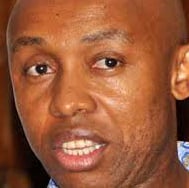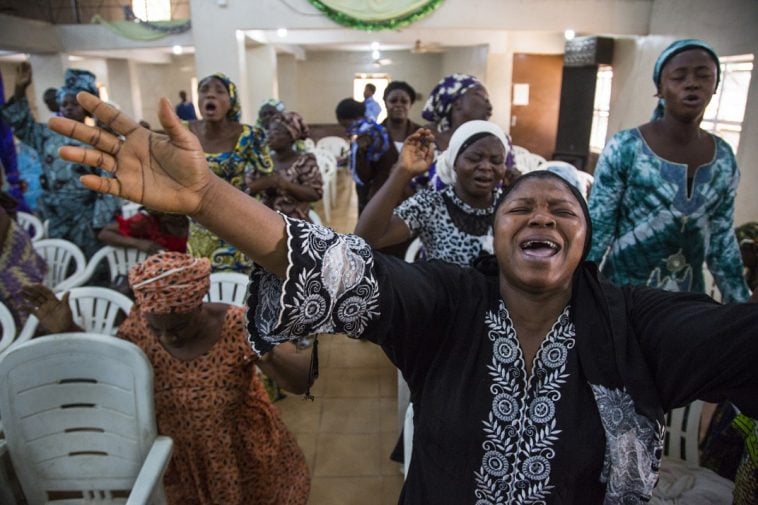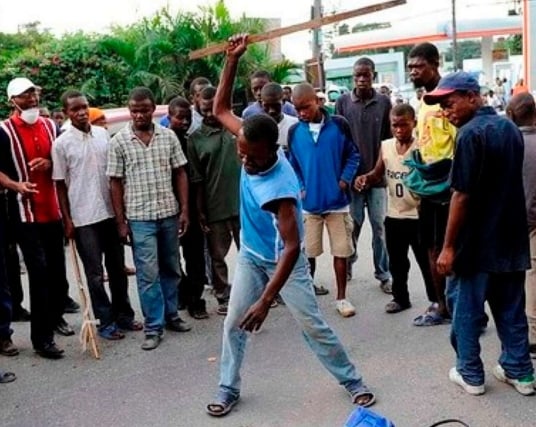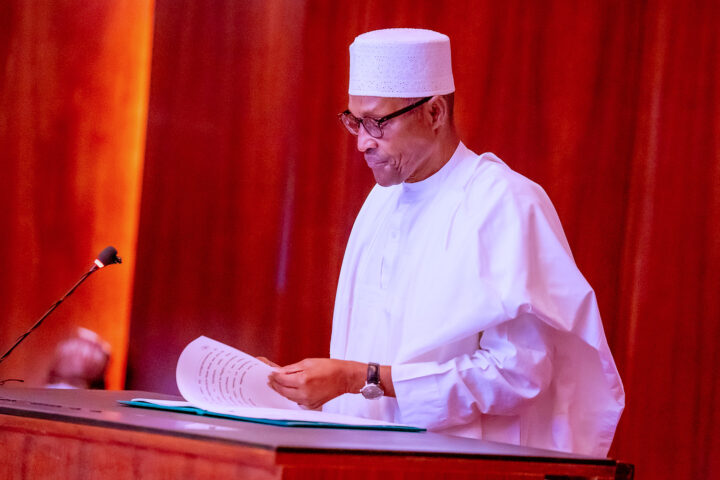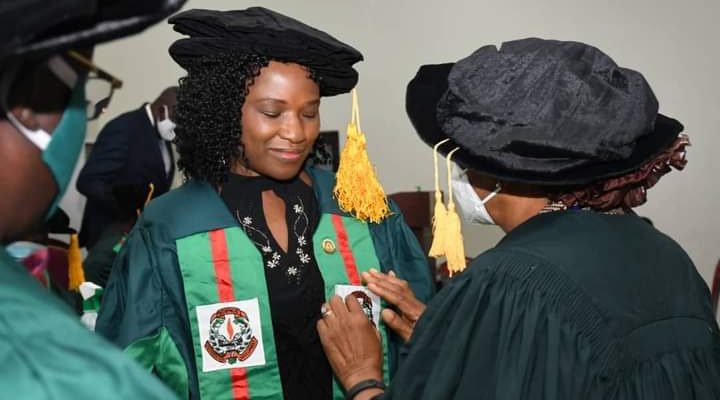My ill-fated country, those you have affronted
with them, you must be equalized by sharing the same affront.
Those you have denied human rights,
Allowed to stand before you but never invited in –
with all of them, you must be equalized by sharing the same affront — Rabindranath Tagore, Gitanjali (Song Offerings) 108 (1910)
Nigeria is a country of pious people and sacred cows. On Fridays, its mosques are filled with prayer and Tafsir. On Sundays, the churches take over with song offerings and evocative homilies. The illegitimate child of the ménage à trois between George Taubman Goldie, his employee, Frederick Lugard and their shared mistress, Flora Shaw, it was almost a matter of fate that the country would live in perpetual search of a prayer.
Composed in 1959 by Lillian Jane Williams, Nigeria’s first national anthem was ultimately a failed effort at inventing a civic prayer to cover for the original sin of illegitimacy that afflicted the country’s birth. Its third stanza ended in an invocation to the “God of all creation” to “grant this our one request” and “help us to build a nation where no man is oppressed.” Crafted only for the men, this prayer forgot that the country also had women and children too.
Under the prayerful invocation of this anthem, the country went through, a pogrom, a civil war, and four coups (including one unsuccessful one) in its first 20 years of Independence accounting for the killing of three of its first four Heads of State and three of its first four heads of government. As a prayer, it did not hold God’s attention.
Advertisement
But rather than find out why God did not listen, the country went for replacement therapy. So, in 1978, that anthem was retired in favour of another national prayer as an anthem. Invented by a committee and arranged as a tune by the Police Band, this second anthem ends again in prayer to the “God of creation” to help us “to build a nation where peace and justice shall reign”. This anthem was launched into a transition and bridled under austerity. It became a totem to treason; the song offered by a succession of military usurpers whose primary vocation was to sow constitutional instability and sunder the nation.
Two decades into the life of this second anthem, it seemed again that it did not cut much ice with the heavens as the country’s problems multiplied in direct proportion to the frequency of its rendition. For the army of prayer warriors in the churches and in the mosques, this was cause for worry. The response was a multiplicity of prayer projects to save Nigeria. Indeed, Nigeria’s second military ruler and its first four-star army general no less, Yakubu Gowon, retired to a full-time ministry known as “Nigeria Prays”.
It was, however, Nigeria’s largest Christian denomination, the Catholic Church, which gave full vent to the enterprise of praying for Nigeria. On June 27, 1993, five days after the military annulled the outcome of the June 12, 1993 elections, and while the country laboured under existential uncertainty as to what was to follow, the Catholic Bishops Conference of Nigeria (CBCN) launched the “Prayer for Nigeria in Distress” as their unique contribution to the search for a sovereign safe harbour for the country.
Advertisement
In its terms, this “prayer” confesses on behalf of Nigerians that “[W]e are sorry for all the sins We have committed and for the good deeds We failed to do”, but pleads with the Almighty to “keep us safe from the punishments we deserve”, without giving any compelling reasons why He should. It admits that “we are weighed down not only by uncertainties, but also by moral, economic and political problems”, begs that God may “be merciful to us your people”, and, with a telling sense of self-awareness asks Him to “spare this Nation Nigeria from chaos, anarchy and doom.”
This prayer is at once an honest confession of the Nigerian condition and a brutal piece of self-assessment. Its authors clearly understand the natural logic of Nigeria’s trajectory is “chaos, anarchy and doom”. What is not clear is why they thought or believed that the way to spare the country these consequences was through the offering of gratuitous weekly prayer recitations.
As it turns out, this prayer has been recited during every Sunday Mass in every Catholic church in Nigeria in the 29 years since then. During that same period, lots of Catholic priests and bishops have offered thanksgiving for people who rigged elections and collected car gifts and cathedrals built with stolen public funds, knowing those to have been the case. Nigeria’s sacred cows continue to receive their benedictions from the pious men who offer prayers to save the country from the doom to which their acts logically condemn it.
Unbeknown to most Nigerians the real prayer for the country was written four years before the Amalgamation thousands of kilometres from Nigeria. It is in a collection of patriotic chants written in 1910 by Bengali mystic and polymath, Rabindranath Tagore, and published under the title “Gitanjali”, for which he won the Nobel Prize for Literature in 1913; the only Indian to have done so.
Advertisement
The tale of Tagore, India and Nigeria make for the most unlikely of narrative coincidence. Tagore was born in 1861, the same year the British possessed Lagos (three years after the formal onset of the British colonial project in India). He died in 1941, just six years before the British project in India ended in that most bloody Partition, the same year in which the Nigerian Regiment helped to restore the Emperor in Ethiopia. From Tagore’s India, the British exported many things to Nigeria, including the Criminal Code, the Verandah, and Frederick Lugard.
It is, therefore, not at all unnatural that Tagore’s prayer for Nigeria was also made in India. Among his collection in Gitanjali, Tagore pens a trilogy of patriotic songs: Gitanjali 106 calls attention to the perils of social exclusion; 107 acknowledges India’s vast underclass of social exclusion in the caste system, and 108 predicts a terrible reckoning if this is not redressed. About this, Tagore wrote in the second stanza of Gitanjali 108:
Day after day, you have avoided human touch
Showing your contempt for the deity that dwells in man.
One day, the Creator’s ruthless fury
will make you sit by famine’s doorway
and share with others what there is to eat and drink.
With all of them, you’ll have to be equalized by sharing the same affront.
These excluded were the people whom another of India’s celebrated figures, Mohandas Gandhi, called the “Harijans” or “God’s people”. It is no accident that Nigeria’s encounter with its reckoning appears to be happening “in God’s name”.
Advertisement
In the north-east, a Jihadist onslaught proclaims a Caliphate in God’s name.
In the north-west, the killers of Deborah claim they did it in God’s name.
Advertisement
In the south-east, adherents of the Indigenous People of Biafra, IPoB, claim to be the children of “Chukwu Okike Abiama”, which translates into the “God of all Creation” in Nigeria’s anthems, both former and current.
All this grasping for the Almighty reflects the reality that the Nigerian state does not exist and has never existed for its underclass. It has only ever treated them as sub-human and expendable.
Advertisement
As the country prepares to select yet another Capone for its project of sovereign organized crime in 2023, these excluded and expended have decided to ask for what is duly theirs. In their methods and numbers, they present Nigeria’s elite for the first time with a proposition for which there are not enough bullets.
For Nigeria, they are Tagore’s prayer in the fourth stanza of Gitanjali 108 answered:
Advertisement
Whoever you fling to a lower level will bind you to that level.
Whoever you keep behind your back is only dragging you backwards.
Whoever you keep occluded,
Hidden in ignorance-darkness,
is shaping a chasm between you and your welfare.
You must be equalized with all of them by sharing the same affront.
A lawyer and a teacher, Odinkalu can be reached at [email protected]
Views expressed by contributors are strictly personal and not of TheCable.
Add a comment
